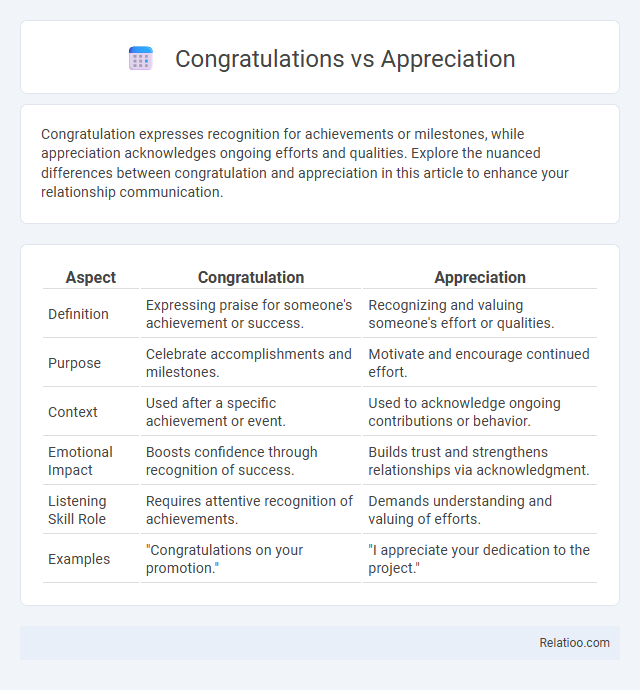Congratulation expresses recognition for achievements or milestones, while appreciation acknowledges ongoing efforts and qualities. Explore the nuanced differences between congratulation and appreciation in this article to enhance your relationship communication.
Table of Comparison
| Aspect | Congratulation | Appreciation |
|---|---|---|
| Definition | Expressing praise for someone's achievement or success. | Recognizing and valuing someone's effort or qualities. |
| Purpose | Celebrate accomplishments and milestones. | Motivate and encourage continued effort. |
| Context | Used after a specific achievement or event. | Used to acknowledge ongoing contributions or behavior. |
| Emotional Impact | Boosts confidence through recognition of success. | Builds trust and strengthens relationships via acknowledgment. |
| Listening Skill Role | Requires attentive recognition of achievements. | Demands understanding and valuing of efforts. |
| Examples | "Congratulations on your promotion." | "I appreciate your dedication to the project." |
Understanding Congratulation and Appreciation
Congratulation signifies acknowledgment of someone's achievement or success, emphasizing celebrating a specific accomplishment, while Appreciation conveys gratitude and recognition for someone's efforts or qualities, highlighting ongoing value rather than a single event. You can express Congratulation to motivate success and Appreciation to strengthen relationships by valuing consistent contributions. Understanding these distinctions helps tailor your communication for effective and meaningful recognition in personal and professional settings.
Key Differences Between Congratulation and Appreciation
Congratulation expresses joy or praise for someone's achievement or success, often celebrating milestones such as promotions, graduations, or awards. Appreciation conveys gratitude or recognition for someone's efforts, qualities, or contributions, emphasizing value rather than a specific accomplishment. The key difference lies in congratulation being outcome-oriented, celebrating specific achievements, while appreciation focuses on acknowledging ongoing efforts or characteristics without necessarily linking to a particular success.
When to Use Congratulation
Use "Congratulation" when acknowledging a specific achievement or milestone, such as a promotion, graduation, or winning an award. It expresses recognition for success and is appropriate in formal and informal contexts to celebrate accomplishments. Avoid confusion with "Appreciation," which conveys gratitude rather than celebration, and use "Congratulation" to emphasize praise for an event or accomplishment.
When to Express Appreciation
Expressing appreciation is essential when acknowledging someone's effort, dedication, or support, especially in professional or personal contexts where gratitude strengthens relationships and motivates continued positive behavior. While congratulations celebrate achievements or milestones, appreciation specifically highlights the value of your actions and contributions regardless of the outcome. You should express appreciation frequently to foster goodwill and encourage ongoing commitment.
The Emotional Impact of Each Gesture
Congratulation triggers feelings of pride and accomplishment, reinforcing success and motivating future achievements. Appreciation fosters a sense of value and belonging, enhancing emotional bonds and boosting morale. Gratitude deepens emotional connection by acknowledging effort and kindness, promoting trust and mutual respect.
Examples of Congratulation in Real Life
Congratulation is used to express joy or praise for someone's achievement, such as saying "Congratulations on your promotion!" or "Congrats on graduating with honors!" Appreciation focuses on recognizing value or effort, like "I appreciate your hard work on this project." You often congratulate friends, family, or colleagues when they reach significant milestones, celebrate successes, or achieve important goals.
Examples of Appreciation in Daily Situations
Examples of appreciation in daily situations include thanking a colleague for their support on a project, expressing gratitude to a friend for their kindness, and acknowledging a family member's effort in household chores. Appreciation emphasizes recognizing someone's actions or qualities, often fostering positive relationships and motivation. Unlike congratulations, which celebrate achievements, appreciation highlights ongoing contributions and effort.
Cultural Variations in Congratulation and Appreciation
Cultural variations influence the expression of congratulation and appreciation, with congratulation often linked to achievements and appreciation tied to gratitude across different societies. In Western cultures, congratulation is typically explicit and celebratory, while in many Asian cultures, it may be conveyed more subtly to maintain humility and social harmony. Appreciation frequently incorporates gestures or formalities unique to each culture, such as bowing in Japan or verbal affirmations in the United States, reflecting diverse norms in recognizing effort and success.
Benefits of Using the Right Expression
Choosing the right expression between congratulation and appreciation enhances communication effectiveness by aligning your message with the recipient's achievements or efforts. Congratulating someone acknowledges specific successes, boosting morale and motivation, while appreciation recognizes ongoing contributions, fostering loyalty and positive relationships. Using your tailored expression appropriately ensures your intent is clearly conveyed, maximizing the impact of your gratitude or praise.
Tips for Balancing Congratulation and Appreciation
Balancing congratulation and appreciation requires recognizing specific achievements with congratulatory messages while expressing genuine gratitude for ongoing efforts. Emphasize clear communication by tailoring congratulations to milestones and appreciation to consistent dedication, fostering motivation and morale. Avoid overusing either term to maintain sincerity and ensure recipients feel valued both for their successes and their everyday contributions.

Infographic: Congratulation vs Appreciation
 relatioo.com
relatioo.com